Cara Gilger's Blog, page 15
January 22, 2019
Untethered, But Anchored
This piece first appeared at Young Clergy Women International, for whom I am grateful for giving it its first home.
A year and a half ago, I left my full-time congregational ministry setting to take an intentional year off from full-time congregational ministry. I had been ordained a decade, serving congregations for a decade and a half, all of it as a program pastor in multi-staff churches. The congregation and I were no longer a fit and I felt something nagging at me.
The nagging had grown so loud and so restless that it eventually overshadowed my fears, which I lovingly named “the great untethering.” I was fearful if I untethered myself from full time congregational ministry, even for a short, determined, amount of time, that I would somehow untether myself from other things. I would lose my grounding, or my sense of self, or my understanding of what had brought me into this beautiful life of serving God in community through Jesus to begin with. I was afraid that like the little old man in the children’s movie Up, once I started to cut the strings to the things that had carried me thus far, it would all come crashing down.
I love to work, I love what God does in community. I love the messy dance of structure and unpredictability that gives movement to days and weeks and seasons of ministry. I didn’t want to lose those things. But I was also chafing in my current ministry setting–like an old, shrunken, itchy sweater, there were some things I knew could not be stretched back into place. I couldn’t tell if it was my setting or me but my suspicion was that it had become a combination of both.
Several months after my departure I was sitting at a judicatory gathering when the facilitator of our training said, “we’re going to go around the room and I’d like you to share your name and where you serve.” I didn’t have an answer, or at least not one that fit into the normal parameters of such gatherings. I quickly leaned over to the other three young clergy women at my table and whispered, half panicked and half joking, “what do I say? Freelance minister?!” “Hell yeah,” whispered back one of my fellow clergy women, “you should say you are a ‘ministerial entrepreneur.’”
Seeing the flicker of hesitation she added, “you know none of our male colleagues would hesitate to be so bold about their broad work,” with a knowing glance. Being forced for the first time in months to explain my ministry, my colleague’s encouragement cracked open something inside me. It wasn’t that I didn’t do ministry… My ministry was just far more expansive and harder to explain than it had been a few months ago.
That fall, I found myself at yet another judicatory gathering. One of the younger clergy in my area asked me what I was up to now that I wasn’t serving a congregation full time. I shared with him the different community projects I was involved in. My children attend a Title I school and I was volunteering in the classroom and serving on the Principal’s diversity committee to look at ways to be more inclusive and affirming of parents of color who make up half of the school population. I was mentoring two students in my neighboring school district one-on-one, once a week. I was preaching with the specific intention of giving my colleagues the gift of rest without the worry of who could competently fill their pulpit. I was editing a book for our denominational publishing house that featured and lifted up the voices of young clergy, and whose proceeds would benefit and support young clergy cohort groups.
This is not the kind of ministry that fits tidily on a business card, but it was giving me life and meaning while allowing me to be more present to relationships that had been neglected in preceding years as the church continued to take more and more of my time. I explained all of this to my younger colleague and finished by saying, “My calling has not changed. I still believe that God is calling me to use my gifts in the world. And I believe that God does some of God’s best work in the church. None of that has changed.”
I will never forget his response: “Well, I really admire that after your last call you still feel called and would still consider a church.” It surprised me because God’s faithfulness to me had not changed. My understanding of what my calling is hadn’t changed, only the context. But the conversation also gave me a gift of clarity that I would soon discover that I needed.
As the anniversary of leaving my full-time call approached, my partner and I discerned that it made no economic or logistic sense for me to return to full-time vocational ministry until the following year when our youngest child started public school. While it was the right decision for us, I struggled. I had given myself one year, with clear, set parameters. The year I had spent off, had been robustly filled with multitudes of ministry but nothing that was socially acceptable in ministry circles. I still didn’t have an official title for a business card or a tidy answer during introduction time.
I could feel again the strings of my “great untethering” snapping and letting go. What would a second year of discernment yield?
Around that time found myself at a Womanist Preaching Conference and as I introduced myself to the coordinator of the event, she asked me the dreaded question “where do you serve? What do you do?” This time I smiled and said, “I’m a freelance minister–I do a little of everything!” and then I hesitantly rattled off some of the things I was doing. She exclaimed “Ah!! I love it! Do not worry, you remind me of me three years ago. My ministry is expansive now!” My colleague’s words tightened a string, I could feel the vibrations of something true to who I was as a called child of God echoing in my heart.
While all of this vocational shaping was happening, the Spirit kept showing up in these brief but profound exchanges. There were also personal shifts happening as well. The “great untethering” started snapping or plucking the strings of things that either no longer suited me or, alternatively, aligned with who God was calling me and my family to be in the world.
We got a Christmas tree, but I no longer practice the suburban mother craziness of seasonal decorating or Pinterest-ing anything. I disassembled my raised garden beds and passed them along to someone for whom that brought great joy (because while I sometimes enjoyed growing our food, I was terrible at it). I bent my economic and ecological commitment of cooking “home-cooked and healthy” every night of the week, every week of the month–sometimes I order pizza or take my kids for burgers. I took box after box out of the attic, sorting, donating, and shredding my way through so much junk. I even dealt with the box full of tax documents from 2007! Slowly, I began slicing through the strings that tethered me to ideas that at one time served a purpose but had now become restrictive and lost in obligation, rather than joy.
Over the years, I have cringed at the phrases “bi-vocational” or “tent making” because implied in their modern use is an economic scarcity, a thinness that I didn’t want tethered to my ministry. They didn’t match my lived experience of God’s audacious generosity. Mary Oliver once wrote that “joy is not made to be a crumb,” but neither is our calling. My calling is not thin broth, but a rich feast.
When I heard God’s call to take my gifts and dedicate them to revealing God’s love in the world, this is the meal I was invited to feast from–one rich with nuance and grace, one filled with surprise and mystery. What I am learning in this season is about the rich, robustness of calling, the way it can take shape in every context and every season. Even when the context doesn’t fit tidily on a business card or as the answer to an introduction question.
I still don’t know “what’s next” for my ministry. I know what’s present for my ministry right now. I can now see a trail of debris behind me on this path as I have untethered from that which did not serve me or how God is calling me. I can see what survived “the great untethering”–the things that are essentially me, the things that matter: loving my neighbor in a local up-close way, seeking justice that helps my neighbor more than myself, being available to the friends and family I have been gifted to make this journey with, writing daily and meditating with the intent of listening deeply to God.
These are the through threads and as my colleagues remind me. They are expansive, not constrictive, because God is expansive, not restrictive. These are the things that tether me–not to who I was or who I will be, but to God and to my calling.
January 17, 2019
Gratitude Note: Mary Oliver
I first read Mary Oliver at nineteen years old. Until that point my knowledge and exposure to poetry consisted of the terribly unimaginive units we were taught in high school English class. There was no joy in these classes, no sense of discovery. However my second year of college a mentor had given me a copy of Oliver’s New and Selected Poems and insisted we meet over coffee to discuss it. Being the ever reliable people pleaser that I am read the volume from front to back and in the pages of that volume I discovered something of myself.
I discovered that there was beauty in stillness. I learned that you didn’t have to say it all to communicate a deep truth. And probably most importantly I discovered that a well turned phrase can crack open possibility in the human heart. This last one has been a guiding concept in my preaching, speaking and leading for years.
And then there was the journey that Oliver set me on that has spanned nearly two decades of my life.
The discovery that I loved poetry led me to Yeats and Dickenson, Lucille Clifton and Naomi Shihab Nye, Clint Smith III and Wendell Berry, David Whyte and Rupi Kaur. On and on I fell in love with the simple way that poetry could speak to the delicate nuances and deep truths about life. I looked to poetry, like scripture to help me make meaning, to gently heal me and to press me forward with courage. I’ve attended poetry retreats with some of my favorite poets, that have given me the space to reflect on my vocation. In fact it was on a retreat in Monterey with the poet David Whyte that I began to imagine the possibility of this ministry I’m building now.
Oliver’s work has spoken to me at different points in my life–when I was leaving a church call that was no longer a good fit The Journey was a life line. As I have aged into middle adulthood it is the simple lines from Don’t Worry for the volume Felicity “Things take the time they take. Don’t/ worry./How many roads did St Augustine follow/before he became St Augustine?” that have been a touchstone.
For all of this and so much more I am grateful for the life and work of Mary Oliver. May her words always be a refuge, a nudge and a place of self discovery.
December 16, 2018
5 Books for a Thoughtful Advent with Children
As a mother and Christian educator I am always looking for resources and books to teach children about faith with theological integrity and engaging narrative. Advent is a season where children are getting lots of messages from Santa to Elf on the Shelf to the manger, I always find this time of the year a good one search for resources that can create a balance for my kids and help the old stories of faith come alive in new ways. Here a a few books that I am adding to our Advent calendar this year:
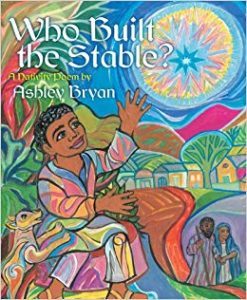 Who Built the Stable: A Nativity Poem by Ashley Bryan
Who Built the Stable: A Nativity Poem by Ashley BryanThis is a lovely book with creative and bright illustrations that invite the reader to think about who built the stable that would receive the Christ child. This book has been a nice pairing with our giving manger tradition because we can make the connection between who prepared to receive Jesus and how we prepare the way to receive Jesus’s love and light into the world.
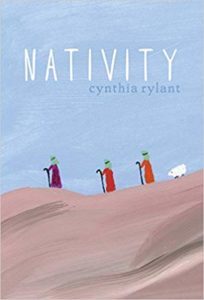 Nativity by Cynthia Rylant
Nativity by Cynthia Rylant This starts with the angels who tell the shepherds the good news and takes readers through Mary’s experience of that news. Transitioning with ease the author connects the good news heard by the angels and Mary and the good news of Christ’s arrival to the teaching of the Beatitudes. This is a book that connects the story of Christmas to the teachings of Jesus seamlessly and without overworking it. Nativity is a resource I will use year round to teach about the Beatitudes and Jesus’s ministry of compassion and love. This is an excellent book for teaching that Christmas is beyond a season, but a larger way of living in the world
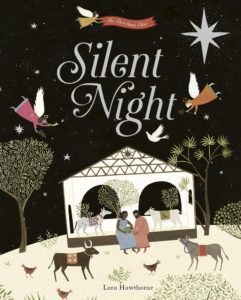 Silent Night by Lara Hawthorne
Silent Night by Lara HawthorneWe use wrapped books for our Advent calendar each year and it is nice to have a book that reflects a hymn to break up our nightly reading. Silent Night is a illustrated telling of the classic hymn with gorgeous illustrations that make the telling of the Christmas story told in the hymn vibrant. This one has become an instant family favorite the way that the pictures draw you in and because we all love a family sing along!
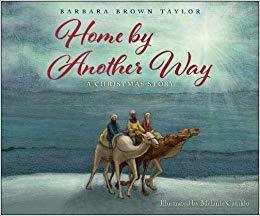 Home by Another Way: A Christmas Story by Barbara Brown Taylor
Home by Another Way: A Christmas Story by Barbara Brown TaylorTheologian and pastor Barbara Brown Taylor brings to life the story of the wise persons as they follow the star, encounter Herod and meet the Christ Child. A lovely and imaginative telling that gives storytellers entry points to ask wondering questions with the readers and reflect on what it was like to be the wise people, Mary and Herod.
December 5, 2018
I Asked for Wonder
“I did not ask for success; I asked for wonder. And You gave it to me.” -Abraham Joshua Heschel
My whole life I have struggled needing to be in control. The lighter way of describing this is to say that I am a planner. I like to know what’s happening. I think we all feel this way in varying and lesser degrees because one of the fundamental things about being human is that our lives are wildly unpredictable. We try to cling to what is knowable in the face of so much that is unknowable about how we will live. We meet this uncertainty in a variety of ways–with fear for what we do not know and cannot control, with trepidation that turns us inward and timid and sometimes with a head strongness that presses into what is unknown as though the pressing can shape what cannot be.
It wasn’t until I discovered hiking that I discovered what it is like to plan something so perfectly–researching and choosing a trail, carefully packing water and other needs into a pack, examining the weather and selecting appropriate gear–and be surprised by wonder. It does not matter how many photos you look at online or how carefully you plan your hike. There is a moment where you turn a bend or pull yourself up over a ridge or look up from where you were focused on planting your feet to see the sunlight stream through the trees and what was unplanned takes your breath away.
Once I could name this experience that I began to understand why I have always been such an avid reader. I live for the way a turn of phrase or a well crafted sentence can open up a new idea like the tight bud of a new flower in the spring sun, of the way a well done story can open worlds. When you open a book or embark on a trail you don’t really have any idea where you might be taken.
It is in these small practices that I have discovered a sense of wonder. Abraham Joshua Heschel once wrote “I did not ask for success; I asked for wonder. And You gave it to me.” Wonder is a spiritual practice, it is a matter of having a heart that is willing to be open enough to be surprised by God’s beauty and love. Wonder is also a practice of trust in divine goodness and willingness to surrender to what you think ought to happen in order to be surprised by what could be. It is a centering practice of creativity and a way to connect to God’s invitation to be a part of what is good and beautiful being created in the world.
It has been only when I have asked for wonder that I have been able to meet God in the creative spaces of my life. It has only been in asking to be surprised that the unknown has shifted from being something to fear to something to great with joy. In asking for wonder, God has given me the chance to ground myself in joy, rather than fear.
November 15, 2018
Current Reads: November 2018
For me, reading and ministry go hand in hand. I read fiction to feed the creative beast that is always hungry and always demanding more so that my preaching continues to be relevant and engaging. I read poetry to ground myself in the wonder and beauty of ordinary things. I read sociology to feed my curiosity because as a pastor I find the way people connect, form community and engage endlessly fascinating. I read leadership books because I am always looking for new metaphors to teach people old truth about how we gather and care for one another with integrity and authenticity. I read memoir to keep the human tendency of judgement at bay and to learn from viewpoints and experiences that differ from my own. And I read for the pure delight of discovering the beauty of a well turned phrase or being introduced to a new perspective.
As the leaves finally change colors and the temps begin to turn I have been hunkering down to get some reading and learning done this fall. Here are some of the books I have taken specific delight in this fall.
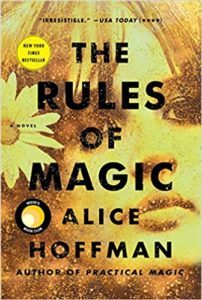 Rules of Magic by Alice Hoffman
Rules of Magic by Alice Hoffman This book was a delight in so many ways. First of all I particularly love a sibling coming of age story that spans decades especially if there are three or more siblings because I love complicated family dynamics in a story. But what I loved the most about this story is that Hoffman explores the complexities of fate, choice, love and grief. Think Chloe Benjamin’s The Immortalist but less dark and more hopeful about the human condition. For you preacher types out there this book gives you several stories and quite a few liftable quotes about love that is neither flat or rote. Hoffman’s dealings on the subject acknowledge the complexity of human relationship, the ways in which we get in our own way and how life and death are complicated in how we make meaning of them.
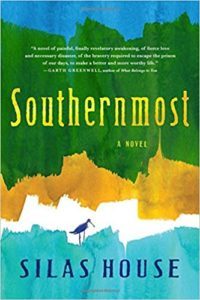 Southernmost by Silas House
Southernmost by Silas HouseI checked this book out from the public library and when I finished it I felt compelled to slip a $20 bill in an envelope with a thank you note and mail it to House. This story about a southern preacher in rural Tennessee changing his beliefs on homosexuality and the fall out personally and professionally that ensues was done so well. Sometimes with topics like these writing can be like pie crust–over work it or over do the point and its tough and indigestible. Instead House creates a lovely and thoughtful and complicated story about family, love and change without being overwork or cliche. If you are a church leader looking for suggestion for the next church book club read, this might be an interesting way to open up thoughtful discussion.
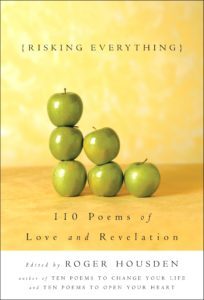 Risking Everything: 110 Poems of Love and Revelation by Roger Housden
Risking Everything: 110 Poems of Love and Revelation by Roger HousdenI love reading full volumes by poets. It’s like listening to the full album of a musician, you really get a feel for what they are trying to accomplish and communicate. However, on occasion I find an edited collection that pulls together a lovely selection of poems and I can discover several new poems or poets in one simple volume. A dear friend recommended this volume when we were browsing the collection at the Urban Abbey and I immediately purchased it and tucked it in my suitcase to bring home. One of my favorites in this selection is Marge Piercy’s To Have Without Holding which opens “Learning to love differently is hard/live with the hands wide open, love/with the doors banging on their hinges,/the cupboards unlocked.” A good word to hear any day.



